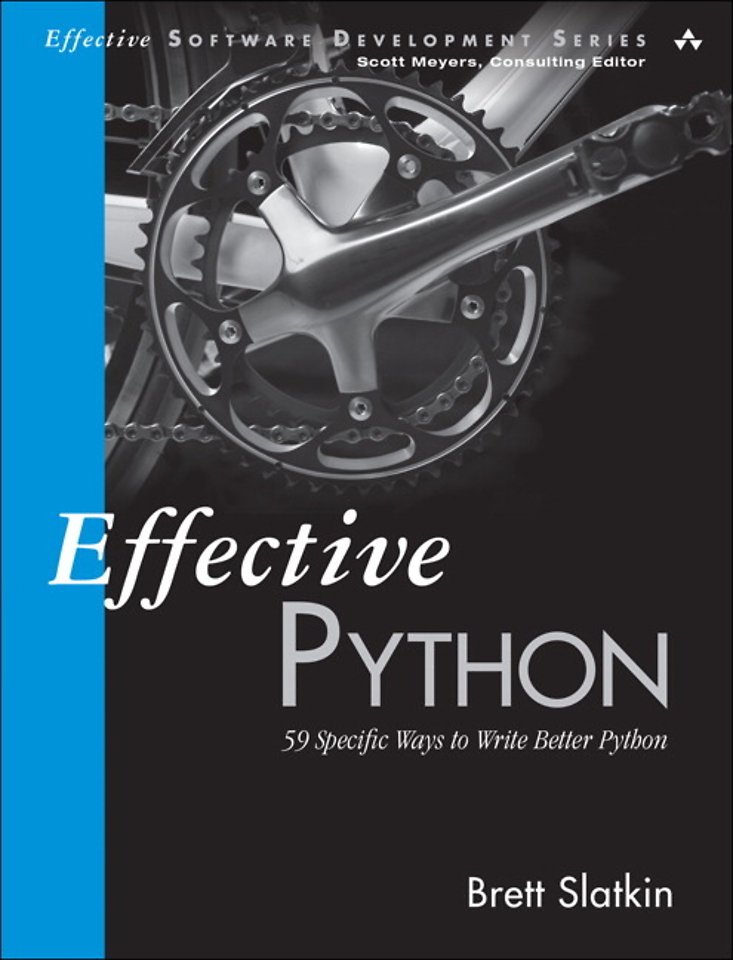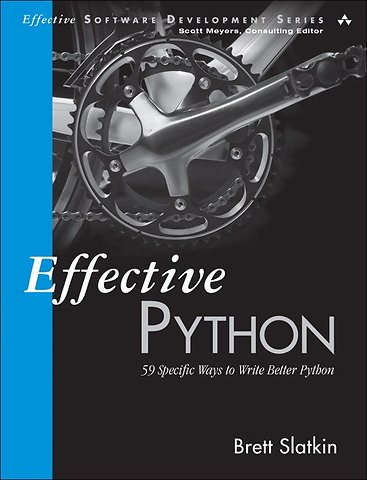Effective Python
59 Specific Ways to Write Better Python
Samenvatting
"Each item in Slatkin’s Effective Python teaches a self-contained lesson with its own source code. This makes the book random-access: Items are easy to browse and study in whatever order the reader needs. I will be recommending Effective Python to students as an admirably compact source of mainstream advice on a very broad range of topics for the intermediate Python programmer." — Brandon Rhodes, software engineer at Dropbox and chair of PyCon 2016-2017
It’s easy to start coding with Python, which is why the language is so popular. However, Python’s unique strengths, charms, and expressiveness can be hard to grasp, and there are hidden pitfalls that can easily trip you up.
'Effective Python' will help you master a truly "Pythonic" approach to programming, harnessing Python’s full power to write exceptionally robust and well-performing code. Using the concise, scenario-driven style pioneered in Scott Meyers’ best-selling Effective C++, Brett Slatkin brings together 59 Python best practices, tips, and shortcuts, and explains them with realistic code examples.
Drawing on years of experience building Python infrastructure at Google, Slatkin uncovers little-known quirks and idioms that powerfully impact code behavior and performance. You’ll learn the best way to accomplish key tasks, so you can write code that’s easier to understand, maintain, and improve.
Key features include
- Actionable guidelines for all major areas of Python 3.x and 2.x development, with detailed explanations and examples
- Best practices for writing functions that clarify intention, promote reuse, and avoid bugs
- Coverage of how to accurately express behaviors with classes and objects
- Guidance on how to avoid pitfalls with metaclasses and dynamic attributes
- More efficient approaches to concurrency and parallelism
- Better techniques and idioms for using Python’s built-in modules
- Tools and best practices for collaborative development
- Solutions for debugging, testing, and optimization in order to improve quality and performance
Specificaties
Inhoudsopgave
Acknowledgments
About the Author
1. Pythonic Thinking
Item 1: Know Which Version of Python You’re Using
Item 2: Follow the PEP 8 Style Guide
Item 3: Know the Differences Between bytes, str, and unicode
Item 4: Write Helper Functions Instead of Complex Expressions
Item 5: Know How to Slice Sequences
Item 6: Avoid Using start, end, and stride in a Single Slice
Item 7: Use List Comprehensions Instead of map and filter
Item 8: Avoid More Than Two Expressions in List Comprehensions
Item 9: Consider Generator Expressions for Large Comprehensions
Item 10: Prefer enumerate Over rang
Item 11: Use zip to Process Iterators in Parallel
Item 12: Avoid else Blocks After for and while Loops
Item 13: Take Advantage of Each Block in try/except/else/finally
2. Functions
Item 14: Prefer Exceptions to Returning None
Item 15: Know How Closures Interact with Variable Scope
Item 16: Consider Generators Instead of Returning Lists
Item 17: Be Defensive When Iterating Over Arguments
Item 18: Reduce Visual Noise with Variable Positional Arguments
Item 19: Provide Optional Behavior with Keyword Arguments
Item 20: Use None and Docstrings to Specify Dynamic Default Arguments
Item 21: Enforce Clarity with Keyword-Only Arguments
3. Classes and Inheritance
Item 22: Prefer Helper Classes Over Bookkeeping with Dictionaries and Tuples
Item 23: Accept Functions for Simple Interfaces Instead of Classes
Item 24: Use @classmethod Polymorphism to Construct Objects Generically
Item 25: Initialize Parent Classes with super
Item 26: Use Multiple Inheritance Only for Mix-in Utility Classes
Item 27: Prefer Public Attributes Over Private Ones
Item 28: Inherit from collections.abc for Custom Container Types
4. Metaclasses and Attributes
Item 29: Use Plain Attributes Instead of Get and Set Methods
Item 30: Consider @property Instead of Refactoring Attributes
Item 31: Use Descriptors for Reusable @property Methods
Item 32: Use __getattr__, __getattribute__, and __setattr__ for Lazy Attributes
Item 33: Validate Subclasses with Metaclasses
Item 34: Register Class Existence with Metaclasses
Item 35: Annotate Class Attributes with Metaclasses
5. Concurrency and Parallelism
Item 36: Use subprocess to Manage Child Processes
Item 37: Use Threads for Blocking I/O, Avoid for Parallelism
Item 38: Use Lock to Prevent Data Races in Threads
Item 39: Use Queue to Coordinate Work Between Threads
Item 40: Consider Coroutines to Run Many Functions Concurrently
Item 41: Consider concurrent.futures for True Parallelism
6. Built-in Modules
Item 42: Define Function Decorators with functools.wraps
Item 43: Consider contextlib and with Statements for Reusable try/finally Behavior
Item 44: Make pickle Reliable with copyreg
Item 45: Use datetime Instead of time for Local Clocks
Item 46: Use Built-in Algorithms and Data Structures
Item 47: Use decimal When Precision Is Paramount
Item 48: Know Where to Find Community-Built Modules
7. Collaboration
Item 49: Write Docstrings for Every Function, Class, and Module
Item 50: Use Packages to Organize Modules and Provide Stable APIs
Item 51: Define a Root Exception to Insulate Callers from APIs
Item 52: Know How to Break Circular Dependencies
Item 53: Use Virtual Environments for Isolated and Reproducible Dependencies
8. Production
Item 54: Consider Module-Scoped Code to Configure Deployment Environments
Item 55: Use repr Strings for Debugging Output
Item 56: Test Everything with unittest
Item 57: Consider Interactive Debugging with pdb
Item 58: Profile Before Optimizing
Item 59: Use tracemalloc to Understand Memory Usage and Leaks
Index
Anderen die dit boek kochten, kochten ook
Net verschenen
Rubrieken
- aanbestedingsrecht
- aansprakelijkheids- en verzekeringsrecht
- accountancy
- algemeen juridisch
- arbeidsrecht
- bank- en effectenrecht
- bestuursrecht
- bouwrecht
- burgerlijk recht en procesrecht
- europees-internationaal recht
- fiscaal recht
- gezondheidsrecht
- insolventierecht
- intellectuele eigendom en ict-recht
- management
- mens en maatschappij
- milieu- en omgevingsrecht
- notarieel recht
- ondernemingsrecht
- pensioenrecht
- personen- en familierecht
- sociale zekerheidsrecht
- staatsrecht
- strafrecht en criminologie
- vastgoed- en huurrecht
- vreemdelingenrecht








